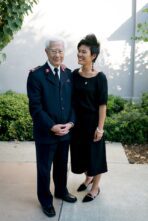Chaplain Joon Park, 41, a second-generation Korean American, remembers being made to sit facing the corner of his Florida preschool classroom as punishment for not speaking English. But by the time he was 10 or 11, his parents had long since stopped speaking Korean at home, and he could no longer remember the language.
“So here I am, Monday through Friday being picked on at school, then I go to a Korean church and I’m being picked on there, too,” said Park, who goes by J.S. Park for writing and online. “And I just thought, in church, there’s not even safety here.”
At a Baptist seminary, he was again an outsider, hiding his social and political views from his deeply conservative fellow students. By the time Park started hospital chaplaincy in 2015, assimilating was almost instinctive. Entering a patient’s room, Park would launch into a lengthy introduction, speaking English quickly so he wouldn’t be read as a foreigner.
“There was so much racism I internalized because I was Korean and I just wanted to be white,” he said. “I thought white was safe, so therefore I ended up hating my Korean self.”
But it wasn’t until he joined the chaplaincy staff at Tampa General Hospital that he found acceptance. In chaplaincy, Park feels challenged daily to be the “hands and feet and heart of Christ.” A onetime atheist who knows what it’s like to stifle his identity, Park said his experiences have prepared him to sit in the sacredness of people’s most vulnerable moments and meet them exactly where they are.
“I’ve described myself before as a grief catcher,” said Park. “I’m catching people’s emotions and feelings and their dreams that were cut short. Sometimes I literally am catching bodies as they collapse. And so I’m there catching people, not as a way to stop them, but to be with them as I go all the way to the floor.”
The work has, he said, given him a self he never had. “What I discovered was, I am not this person split in half between Korean and American,” said Park. “I’m fully Korean. I’m fully American. And it makes me more and not less. It doesn’t make me torn between two worlds. Instead, there are many worlds in me.”
RELATED: In ‘Learning Our Names,’ Asian American Christian authors reclaim their stories
Playing down her Asian identity wasn’t a problem for Nikole Lim, 34, who was raised to celebrate her Chinese heritage at the Salvation Army church her grandfather pastored in San Francisco’s Chinatown.

Nevertheless, Lim struggled to conform. Her baggy clothes and boisterous personality didn’t jibe with cultural expectations for women. “I felt like there wasn’t enough room for who I was as a person, being that I wanted my leadership to expand beyond the church walls, being that I wanted to use fashion and what I wore as an expression of who I am, being that I was also very vocal and very loud and had a lot of strong emotions that weren’t often nurtured or celebrated in our more Chinese context.”
Beginning in college, Lim worked for international nonprofits as a documentary filmmaker, focusing on stories of survivors of war, famine and abuse. In 2010, Lim befriended a 13-year-old girl involved in a wedding she was filming in Zambia. “She had this attitude, she’d roll her eyes at me all the time. I was just like her when I was 13,” Lim said.


